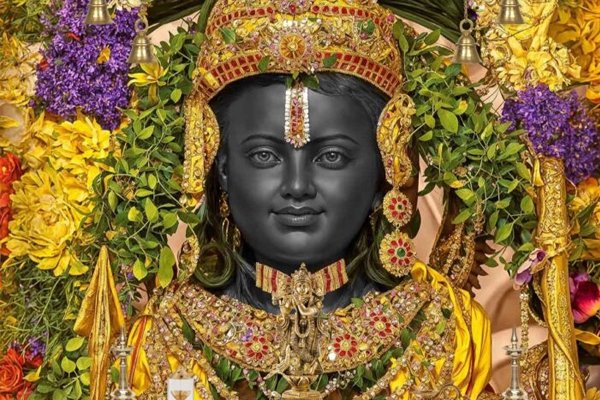Ram Navami 2025: Celebrating the Birth of Lord Rama

Introduction
Ram Navami, one of the most significant Hindu festivals, marks the birth of Lord Rama, the seventh avatar of Lord Vishnu. This auspicious day falls on the ninth day (Navami) of the Chaitra month in the Hindu calendar, which coincides with April 6, 2025. The festival holds immense cultural and spiritual importance for millions of devotees worldwide, as Lord Rama is revered as the epitome of dharma (righteousness), maryada (morality), and ideal kingship.
The Significance of Ram Navami
Ram Navami is not just a celebration of Lord Rama’s birth but a reminder of his virtues and teachings. Lord Rama, the protagonist of the epic Ramayana, is a symbol of truth, honor, and devotion to duty. His life exemplifies the ideals of righteousness (dharma) and the triumph of good over evil. Observing Ram Navami is believed to bring peace, prosperity, and spiritual enlightenment to devotees.
Mythological Background
According to Hindu mythology, Lord Rama was born to King Dasharatha and Queen Kaushalya in Ayodhya. He was an incarnation of Lord Vishnu, who took birth on Earth to defeat the demon king Ravana and restore dharma. His life, as narrated in Valmiki’s Ramayana, teaches valuable lessons on duty, respect, and the power of truth.
The story of Lord Rama’s life, including his exile, devotion to his parents, unwavering love for Sita, and battle against Ravana, is an inspiration for mankind. Ram Navami celebrates not just his birth but also his divine qualities that continue to guide devotees in their spiritual journey.
Rituals and Traditions of Ram Navami
Ram Navami is observed with great devotion and fervor across India and in many parts of the world. The day is marked by various religious activities, including fasting, prayers, bhajans, and processions.
1. Fasting and Devotional Practices
Many devotees observe a fast on Ram Navami, which may be a nirjala (waterless) or phalahar (fruit-based) fast. Fasting is believed to purify the mind and body and enhance spiritual focus. Devotees also recite Ramcharitmanas, Ramayana, and chant the Rama Nama (name of Lord Rama) to seek his blessings.
2. Special Pujas and Havan
Temples across the country organize special pujas and havan in honor of Lord Rama. The rituals include offerings of flowers, fruits, and sweets, along with chanting of Vedic mantras and kirtans. The idol of Lord Rama is often decorated beautifully, and his birth is celebrated with joy and enthusiasm.
3. Processions and Ramlila Performances
Grand processions, known as Shobha Yatras, are carried out in many cities, where devotees carry idols of Lord Rama, Sita, Lakshmana, and Hanuman while singing devotional songs. Many places also organize Ramlila, a dramatic enactment of the life and deeds of Lord Rama, attracting large audiences.
4. Ayodhya Celebrations
Ayodhya, the birthplace of Lord Rama, witnesses grand celebrations on Ram Navami. Devotees throng to the city’s temples, especially the Ram Janmabhoomi Temple, to offer prayers. The Sarayu River sees thousands of devotees taking a holy dip, believing it to be spiritually purifying.
The Spiritual Essence of Ram Navami
The festival is not just about celebrations but also about introspection and following the path of righteousness. Lord Rama’s life embodies:
-
Devotion to Duty: As a prince, husband, and ruler, Lord Rama upheld his responsibilities with unwavering dedication.
-
Respect for Elders: His obedience to his parents and willingness to embrace exile for their honor is a lesson in humility and respect.
-
Compassion and Justice: His rule, famously called Rama Rajya, was marked by fairness, peace, and prosperity for all.
On Ram Navami, devotees are encouraged to reflect on these virtues and incorporate them into their lives.
Ram Navami 2025: A Unique Celebration
With Ram Navami falling on April 6, 2025, devotees are gearing up for grand celebrations. The recently inaugurated Ram Mandir in Ayodhya is expected to host one of the most significant gatherings in history. The festival will witness:
-
Massive Devotional Gatherings: Millions of pilgrims are expected to visit Ayodhya to witness the grandeur of the celebrations.
-
Cultural Programs: Various spiritual discourses, bhajans, and plays based on Ramayana will be organized.
-
Nationwide Festivities: Temples and spiritual organizations across India will hold special pujas, yatras, and community feasts.
How to Celebrate Ram Navami at Home
Even if one cannot visit temples or Ayodhya, Ram Navami can be celebrated at home with devotion and sincerity:
-
Begin the Day with a Bath and Prayers: Cleanse yourself and offer prayers to Lord Rama.
-
Recite the Ramayana or Chant ‘Jai Shri Ram’: Reading or listening to the Ramayana brings divine blessings.
-
Light a Lamp and Offer Bhog: Prepare prasad such as panakam (sweet drink), kosambari (salad), and sweets like halwa or laddoos.
-
Engage in Bhajans and Kirtans: Singing devotional songs creates a pious and joyous atmosphere.
-
Donate to the Needy: Charity and feeding the poor is an essential part of Ram Navami celebrations.
Conclusion
Ram Navami is more than a festival—it is a spiritual journey that connects devotees to Lord Rama’s virtues. In 2025, as the celebrations reach an unprecedented scale, it is an opportunity for people to embrace the teachings of Maryada Purushottam Rama. Whether in temples, through grand processions, or in the quiet devotion of one’s home, celebrating Ram Navami with faith and dedication brings inner peace and divine blessings.
